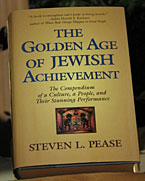Excerpt:
Sports©
Professional Football
Anyone who lived in the Miami-Fort Lauderdale area during the 2002/2003 football season might have told you the Miami Dolphins had two Jewish quarterbacks. Jay Fiedler was the starter and Sage Rosenfels, a backup. With two of the fifty-three players on the Dolphin's roster, you might have inferred Jews were reasonably well represented in the National Football League. Two was twice what one might expect.
Not so. Miami just happened to be the one place in the NFL where the sample was unrepresentative. In 2002/2003 there were 1,699 players on the final NFL rosters of the thirty-two teams (fifty-three for all but the Houston Texans, the newest team, with fifty-six). Using the 2.1 percent benchmark, thirty-four Jewish NFL players could have been projected. Instead, there were six, about one-sixth the projection. It turns out Miami was the fluke. In addition to Fiedler and Rosenfels, Hayden Epstein was a place kicker for Minnesota (and before that Jacksonville.) Lennie Friedman was a guard for Denver. Josh Miller was a punter for Pittsburgh and Mike Rosenthal was right tackle for the New York Giants.
Numbers at the end of the 2004 season were comparable with seven active Jewish players: Fiedler, Friedman, Miller, Rosenfels, Rosenthal, plus Antonio Garay at the Cleveland Browns and Igor Olshansky at the San Diego Chargers. Still a far cry from thirty-four. (As an aside, the BC Lions of The Canadian Football League had Noah Cantor who, for a time, was joined by Gus Ornstein before Ornstein became inactive.)
Offsetting their lowly representation as players, Jews have beat the odds as NFL Hall of Fame inductees. Given their under representation as active Jewish players, Jews would seem unlikely to have more than a single member among the 229 inductees. Instead they have six, They include:
- Al Davis, General Partner of the Oakland Raiders and a former coach.
- Benny Friedman, the NFL's first great passer, played for Cleveland, Detroit, New York (Giants) and Brooklyn
- Sid Gillman, Coach of the Los Angeles Rams & Los Angeles/San Diego Chargers
- Marv Levy, Coach of the Buffalo Bills and Kansas City Chiefs
- Sid Luckman, Quarterback of the Chicago Bears
- Ron Mix, Offensive Tackle for the Los Angeles/San Diego Chargers and the Oakland Raiders....
